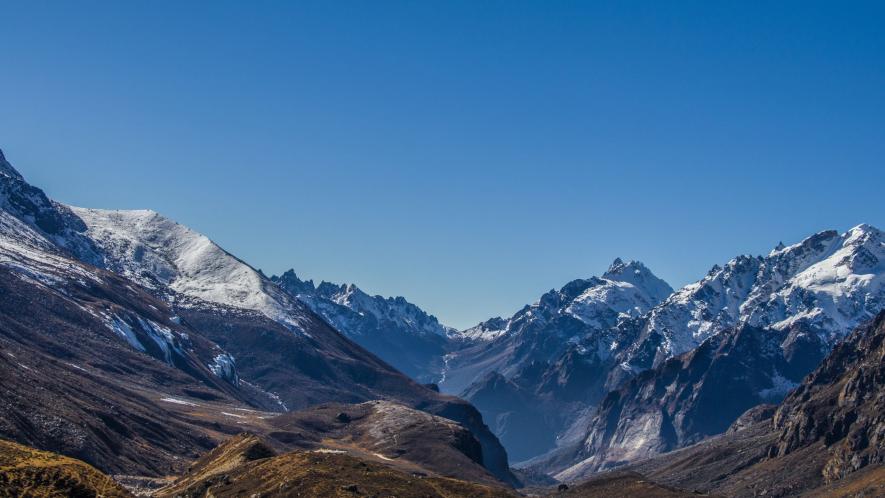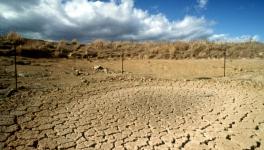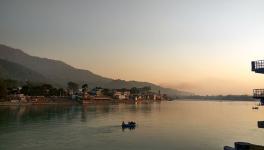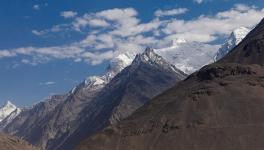'Early Warning for All' Cannot Come Soon Enough for the Hindu Kush Himalaya.

Representational Image. Image Courtesy: Wikimedia Commons
Patna: The Hindu Kush Himalaya region is a hotspot for risks related to climate-driven disasters. Scientists and climate change experts have stressed the need to make early warnings for all a reality for those communities exposed.
Pema Gyamtsho, Director General of the Kathmandu-based International Centre for Integrated Mountain Development (ICIMOD), said on Friday that the economic price of climate-driven storms, floods, heatwaves, and droughts has been calculated for the first time—and found to have already, over the course of the last two decades, cost humanity, collectively, $16 million an hour. Two-thirds of the costs were due to the loss of life, the rest to property and other assets.
"These are not mere statistics to the Hindu Kush Himalaya. Already, across our region this year, families have borne unbearable losses due to climate disasters. Hundreds of lives have been lost. Many more have been turned upside down as homes, crops, and possessions have been lost in devastating floods and landslides. Most recently, last week’s flood of the Teesta River in Sikkim caused by a glacial lake outburst served as a stark reminder that nature's fury knows no bounds," Gyamtsho said.
He further pointed out that this year’s International Day for Disaster Risk Reduction falls as families, scientists, and policymakers across our region take stock of the heavy human and economic costs of this monsoon and rising global temperatures.
They will also be looking forward because climate-driven disasters are set to soar. The United Nations Office for Disaster Risk Reduction anticipates we'll see 560 disasters annually by 2030, pushing an additional 37.6 million people into extreme poverty.
According to him, the science shows that our region is a hotspot for risks. Not only those associated with extreme rain and cryosphere change but also heatwaves, droughts, and toxic air. So, while we count the costs of events this monsoon, the onus is on all of us who serve this region and its people to move with greater speed and ambition to join the dots between science, policy, and action and to make good on the ambition to make early warning for all a reality for those communities exposed.
"We badly need donors to recognise the extent of our exposure to risk in this region: both in terms of numbers and the scale of hazards, but also in terms of the population size impacted. We urgently need the Adaptation Fund, the Green Climate Fund, and the Children's Investment Finance Fund to release funds ever faster to this region and for compensation mechanisms to be operationalised."
At ICIMOD, we will be advocating for both globally. We will also be working across the region to build out a culture of data-sharing around disaster preparedness and response, to educate policymakers about gaps and key areas for action, to equip communities with innovative and accessible technologies, and to scale out community-based flood early warning systems.
"Our region shows the huge inequality there is in terms of exposure to hazards worldwide. Our research tells us, too, that women and vulnerable groups are disproportionately affected when a crisis hits. We pledge to fight this inequality by mobilising the tools, knowledge, and funds to ensure people in this region are resilient to future shocks, placing women and vulnerable groups at the heart of our strategies. Early warning for all cannot come fast enough for the countries of the Hindu Kush Himalaya," he said.
Earlier, Gyamtsho said the HKH region is seeing an increase in adverse impacts from climate change, which will only increase in intensity and frequency. "The dangerous impacts of global warming are already being felt throughout the Hindu Kush Himalaya in record-breaking heat waves, droughts, natural disasters, unpredictable snowfall, and precipitous and largely irreversible glacial melt. We need urgent global action to protect the lives and livelihoods of this region's two billion people and safeguard the countless, irreplaceable life forms that exist only here."
The HKH is home to 240 million people, and nearly a quarter of the world’s population depends on the water that flows from its mountains. Therefore, the fight against climate change is critically important and requires urgent global action.
Get the latest reports & analysis with people's perspective on Protests, movements & deep analytical videos, discussions of the current affairs in your Telegram app. Subscribe to NewsClick's Telegram channel & get Real-Time updates on stories, as they get published on our website.























